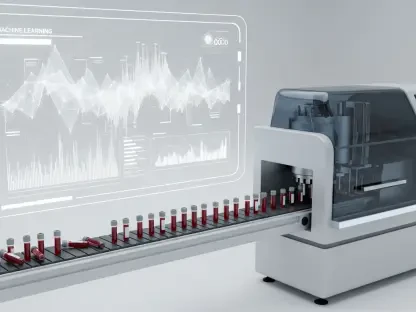Imagine a world where chronic diseases like cardiovascular disorders, metabolic conditions, and autoimmune issues are treated not by altering the very fabric of DNA, but by subtly tweaking how genes are expressed—a safer, more precise approach to healing that could transform countless lives. Epigenic Therapeutics, a biotechnology innovator founded in 2021, is making this vision a reality with its recent $60 million Series B financing round. This substantial funding, supported by industry heavyweights such as Lapam Capital and Qiming Venture Partners, underscores a growing belief in the transformative power of epigenetic medicine. The company’s mission is to develop therapies that regulate gene expression through mechanisms like DNA methylation, avoiding the risks associated with traditional gene-editing techniques. With this financial boost, Epigenic is poised to accelerate clinical trials, potentially bringing groundbreaking treatments to patients faster than ever. Dr. Bob Zhang, Co-founder and CEO, has highlighted the dedication to pushing epigenetic solutions forward, signaling a new era in medical innovation.
The Science Behind Epigenic’s Breakthroughs
Pioneering Epigenetic Modulation
At the heart of Epigenic Therapeutics’ approach lies the proprietary EPIREG™ technology platform, a game-changer in the realm of gene modulation. Unlike conventional gene-editing methods that physically cut DNA, risking unintended consequences, EPIREG™ focuses on silencing specific genes through epigenetic mechanisms such as DNA methylation and histone modification. This method prioritizes safety by minimizing off-target effects, addressing a critical concern in genetic therapies. The platform’s design allows for durable and precise control over gene expression, offering hope for patients with chronic conditions where traditional treatments often fall short. By targeting the epigenome rather than the genome itself, Epigenic is carving out a niche that could redefine therapeutic standards across multiple disease areas, from metabolic disorders to ocular conditions.
The significance of EPIREG™ extends beyond its technical prowess to its potential clinical impact. This technology enables a tailored approach to treatment, adjusting gene activity without permanent alterations to the genetic code, which is a safer bet for long-term patient outcomes. The focus on epigenetic regulation taps into a growing understanding of how environmental and lifestyle factors influence gene expression, providing a more holistic framework for tackling complex diseases. Moreover, the platform’s adaptability means it can address a wide range of therapeutic needs, making it a versatile tool in the biotech arsenal. As Epigenic pushes forward with clinical development, the success of EPIREG™ could validate epigenetics as a cornerstone of modern medicine, inspiring further research into non-invasive gene modulation strategies.
Advanced Delivery and Targeting
Complementing the EPIREG™ platform is EpiTax™, an innovative lipid nanoparticle (LNP) delivery system designed to transport epigenetic tools to specific tissues with remarkable precision. Targeting areas such as the liver and extrahepatic organs, EpiTax™ expands the therapeutic reach of Epigenic’s technologies, ensuring that treatments can address diseases in diverse bodily systems. This delivery mechanism overcomes a significant hurdle in genetic therapies—getting the right tools to the right place without degradation or loss of efficacy. By enhancing the specificity of delivery, EpiTax™ reduces the likelihood of side effects, a persistent challenge in drug development. The system’s ability to navigate complex biological environments marks a leap forward in making epigenetic therapies practical for widespread clinical use.
The development of EpiTax™ also highlights the broader importance of delivery systems in the evolution of genetic medicine. Effective targeting is often the difference between a promising concept and a viable treatment, and Epigenic’s focus on this aspect demonstrates a commitment to real-world application. The integration of EpiTax™ with EPIREG™ creates a synergistic effect, amplifying the potential to treat conditions like viral hepatitis and cardiovascular diseases with unprecedented accuracy. This dual-platform approach not only broadens the scope of treatable conditions but also sets a benchmark for how biotech firms can tackle logistical challenges in therapy deployment. As clinical trials progress, the performance of EpiTax™ will likely draw attention from across the industry, potentially influencing how future therapies are designed and delivered.
AI-Driven Innovation
Epigenic’s commitment to cutting-edge technology is further exemplified by the AIAID™ platform, an AI-driven system that streamlines the discovery and optimization of epigenetic medicines. By leveraging a self-developed foundational model for epigenetics, AIAID™ supports critical processes such as target identification, accessibility prediction, and sgRNA design. This platform also facilitates virtual epigenetic modulation and multi-omics analysis, providing a comprehensive data-driven approach to drug development. The use of artificial intelligence in these tasks significantly reduces the time and cost associated with traditional research methods, allowing Epigenic to iterate and refine therapies at an accelerated pace. Such innovation positions the company at the forefront of a tech-savvy biotech landscape.
Beyond efficiency, AIAID™ represents a paradigm shift in how biotechnology harnesses computational power for therapeutic advancement. The platform’s ability to perform AI-driven de novo protein design and directed evolution enhances the precision of EPIREG™ tools, ensuring that each therapeutic candidate is optimized for maximum impact. This integration of AI not only improves the likelihood of clinical success but also reflects a broader industry trend toward data-centric solutions in healthcare. As Epigenic continues to refine AIAID™, the insights gained could inform not just their own pipelines but also inspire other firms to adopt similar technologies. The ripple effect of this platform may well accelerate the entire field of epigenetic medicine, making treatments more accessible and effective for patients worldwide.
Industry Impact and Investor Confidence
A Vote of Confidence from Major Players
The recent $60 million Series B financing round for Epigenic Therapeutics speaks volumes about the trust placed in the company’s vision by some of the most influential investors in the healthcare sector. Firms like Lapam Capital, Qiming Venture Partners, OrbiMed, and IFSC have thrown their weight behind Epigenic, bringing not just capital but also extensive expertise and networks to the table. This backing is a clear signal of confidence in the potential of epigenetic therapies to address unmet medical needs. The involvement of such prominent players also underscores the scalability of Epigenic’s platforms, suggesting that the market sees significant commercial and clinical value in their approach. This financial milestone is set to propel the company’s clinical programs forward, hastening the journey from lab to patient.
The investor enthusiasm surrounding Epigenic also sheds light on the strategic alignment between the company’s goals and broader market demands. Each of these venture capital firms has a proven track record of supporting transformative healthcare innovations, and their collective endorsement highlights Epigenic’s role as a leader in the epigenetic space. The funding will enable rapid advancement of key pipelines targeting chronic and complex conditions, potentially setting new benchmarks for therapeutic safety and efficacy. Furthermore, the diverse expertise of these investors—from Lapam Capital’s focus on early-stage biomedical ventures to OrbiMed’s global healthcare investment reach—provides Epigenic with a robust foundation for navigating the challenges of clinical development. This partnership dynamic could serve as a model for how biotech startups secure the resources needed to make a lasting impact.
Shaping the Future of Medicine
Investor support for Epigenic Therapeutics reflects a larger trend within the biotechnology industry, where epigenetic therapies are increasingly viewed as a safer and more adaptable alternative to traditional gene-editing techniques. The shift toward epigenetics is driven by a recognition that modulating gene expression, rather than altering DNA, offers a lower-risk path to treating complex diseases. Epigenic’s position at the forefront of this movement is bolstered by its innovative platforms, which promise to tackle conditions that have long evaded effective solutions. The $60 million Series B round is not just a financial win but a validation of the idea that epigenetics could fundamentally change how medicine approaches chronic illness, potentially benefiting millions of patients globally.
This growing focus on epigenetic therapies also points to an evolving landscape where safety and precision are paramount. The industry’s pivot toward such methods is evident in the increasing number of firms exploring similar technologies, but Epigenic stands out due to its comprehensive approach combining advanced delivery systems and AI-driven research. The implications of this trend extend beyond individual companies to the healthcare system at large, where safer therapies could reduce long-term costs and improve patient outcomes. As Epigenic advances its clinical programs over the coming years, the results could catalyze further investment in epigenetics, encouraging a collaborative environment where innovation thrives. The question lingering in many minds is how quickly these therapies will transition from promising concepts to widely available treatments, reshaping medical paradigms in the process.
Reflecting on a Transformative Milestone
Looking back, Epigenic Therapeutics’ achievement of securing $60 million in Series B financing stood as a defining moment that propelled the company into the spotlight of epigenetic medicine. The integration of groundbreaking platforms like EPIREG™, EpiTax™, and AIAID™ showcased a commitment to redefining treatment through precision and safety. Support from esteemed investors such as Lapam Capital and Qiming Venture Partners validated the potential of these technologies to address critical health challenges. Moving forward, the focus should be on closely monitoring clinical trial outcomes to assess how these therapies perform in real-world settings. Stakeholders across the biotech field are encouraged to consider partnerships that could amplify the reach of epigenetic solutions, while researchers might explore complementary innovations to enhance delivery and efficacy. This pivotal funding marked just the beginning, setting the stage for Epigenic to potentially lead a broader movement toward safer, more effective medical interventions.









